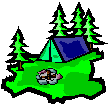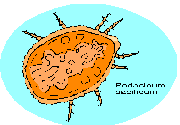Tick-Borne Encephalitis
tick-borne encephalitis - the disease

This is a tick-borne viral disease that occurs in wooded and forested areas in certain countries in Europe. The virus lives in small wild animals, mostly rodents. Ticks can transmit this virus to humans. Rarely, people may also be infected with the virus by drinking unpasteurised milk from infected goats, sheep and cattle.
Most people who are infected do not have symptoms or only have a mild flu-like illness. However, this virus can cause severe brain disease and can be fatal if meningitis or encephalitis occurs. Tick-borne encephalitis is a seasonal disease- it is spread in spring and early summer in Russia, where it is also known as Russian Spring-Summer encephalitis, and from spring to early autumn in Europe (April to October).
Areas Of Risk

The disease is epidemic in European Russia and the Baltic States, the far east of the former USSR, China, Mongolia, Korea and Japan, Austria, Germany, Poland, Hungary, the Balkans, Czech Republic, Slovakia, and Scandinavia.
Who Is At Risk? How Can It Be Prevented?

Tick-borne encephalitis is a risk for people who are spending time in rural forested areas of the infected countries during risk season. For example, people camping, hiking or working as foresters should give consideration to obtaining the vaccine and preventing tick bites with insect repellent containing DEET. Impregnating clothes and camping gear with Permethrin, an insecticide, will be useful to prevent tick bites. Travellers should use designated footpaths if available as people brushing against grasses and undergrowth in the forest most commonly pick up ticks. Travellers should also avoid drinking any unpasteurised milk from goats, sheep or cows. Person to person transmission has not been reported.
Who Should Receive The Vaccine

Vaccination is recommended for travellers going to endemic areas from April to October who are involved in work or recreational activities in forested areas. Travellers who do not go to forested areas and who do not drink unpasteurised milk are at no risk.
Travellers over the age of 60 who are at risk should give special consideration to vaccination, as older travellers are more likely to develop neurological side effects from the disease.
The vaccine is available in Europe and can be given to anyone older than
18 months of age. It gives protection rates of greater than 98%.
Rapid immunisation can be given with
- 2 shots a week apart providing cover for 4 weeks, or
- 3 shots spaced over 21 days providing cover for 18 months.
People with more time can have a standard long term schedule spaced over several months that will provide 3-5 years cover. In Australia, supply of the vaccine is restricted to people who are at high risk. If you require this vaccine, our clinic may be able to source it if we are given sufficient notice.
Updated August 2021.


